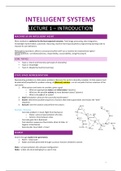Samenvatting
[ Intelligent Systems ] Summary | Lecture Notes
- Instelling
- Vrije Universiteit Amsterdam (VU)
These are lecture notes of Intelligent Systems from the study Lifestyle Informatics/Artificial Intelligence at VU Amsterdam. Everything marked in yellow is extra important, everything that's blue is an example.
[Meer zien]




